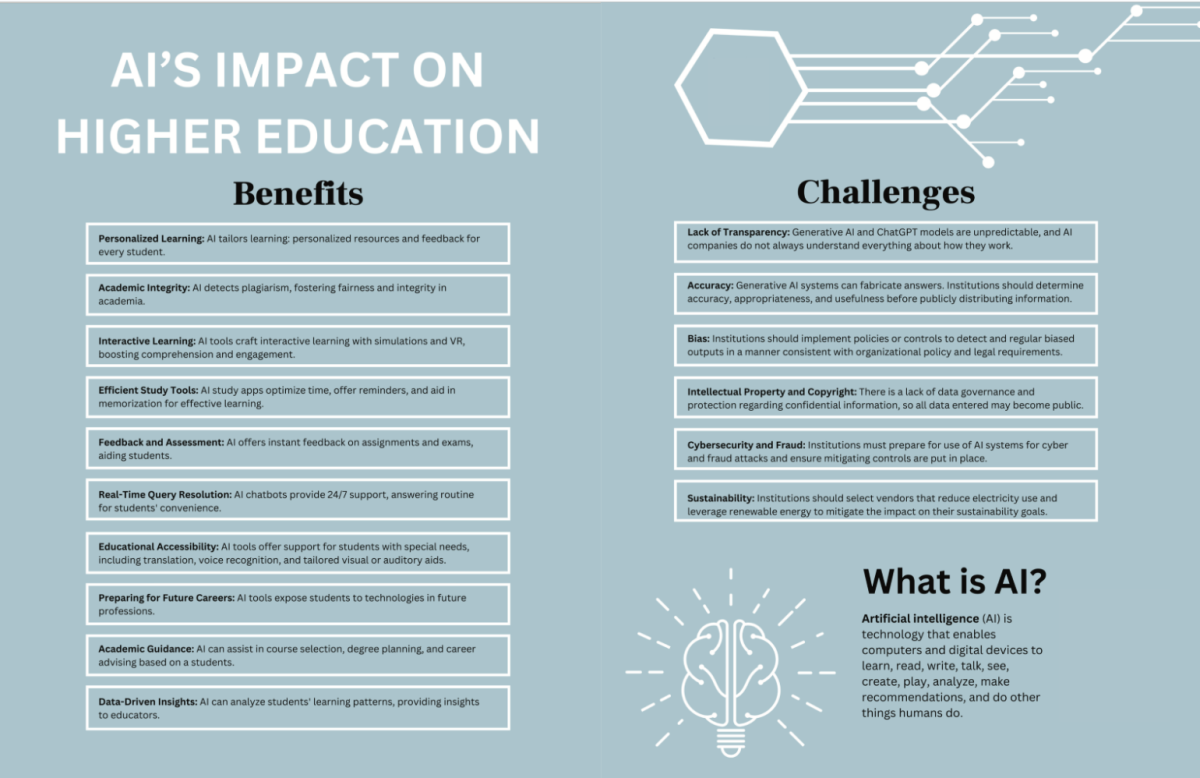In a groundbreaking leap forward for artificial intelligence, a cutting-edge algorithm has achieved unprecedented levels of problem-solving, raising the bar for machine learning capabilities. As AI continues to reshape industries and redefine possibilities, this latest development signals a pivotal moment in the evolution of intelligent technologies, sparking both excitement and debate about the potential impact on our daily lives.
The lede you just read was generated by ChatGPT, a chatbot developed by AI and launched in November 2022. ChatGPT serves as one of the largest and fastest-growing AI platforms.
“[The] AI chatbot quickly gained over 100 million users, with the website alone seeing 1.8 billion visitors a month,” Maria Diaz, a staff writer for ZDNet, wrote in an article about AI chatbots.
ChatGPT has marked a turning point for AI and AI systems, according to the International Business Machines corporation.
“The last time generative AI loomed this large, the breakthroughs were in computer vision, but now the leap forward is in natural language processing (NLP),” IBM stated on their website, “and it’s not just human language: Generative models can also learn the grammar of software code, molecules, natural images, and a variety of other data types.”
AI is a swiftly growing technology that has a higher prevalence in the classroom. Many conversations are circulating about the power of this platform. However, the question still remains: what is AI and how do we address its growing presence in society?
Michael Galloway, WKU associate professor of computer science in the School of Engineering and Applied Sciences, explained AI in his own words. “AI is the idea of human intelligence applied to non-human systems,” Galloway said. “Most commonly, this is targeted at software and hardware digital computing systems.”
Galloway said AI can respond to rules-based algorithms and alter the systems, “to produce the desired results ‘learning.’”
“In simple terms, Artificial Intelligence refers to computer systems or machines that are designed to perform tasks that typically require human intelligence,” ChatGPT said when asked to describe AI. “These tasks include things like problem-solving, learning from experience, recognizing patterns, and understanding natural language. AI systems are programmed to mimic human-like cognitive functions, allowing them to handle complex tasks and adapt to new situations without explicit programming for each scenario.”
Essentially, AI can handle complex human tasks unlike any other machine, code or software system – which means it can be utilized across disciplines and professions.

Society interacts with AI on a daily basis. AI stretches beyond chatbot systems such as ChatGPT. It lives within phones and is embedded in frequently used applications.
“Examples of these systems include intelligent voice systems [Alexa and Siri], social media platforms that provide output based on our interactions [Facebook and Instagram],” Galloway said, “and media playback platforms that provide content based on our historical preferences [Spotify and Netflix].”
AI is also found in smart home devices such as thermostats, lights and vehicle adaptive cruise control. It can also be used in image recognition software and for shopping recommendations.
Galloway said AI systems can improve productivity as well as provide entertainment. However, he said AI can also “possibly influence the user in a direction they would have not chosen without using the AI system.”
The future of AI is unclear and the systems are continually changing and advancing.
“The applications for this technology are growing every day, and we’re just starting to explore the possibilities,” the IBM website states. “As the hype around the use of AI tools in business takes off, conversations around ethics become critically important.”
AI implementation in the classroom and in everyday life explores a conversation rooted in ethics and how AI could potentially augment reality. For now, focus is on what AI does and how to go about using the systems provided to us.
“As artificial intelligence continues to push the boundaries of innovation, its transformative impact on society becomes increasingly evident,” ChatGPT said. “From revolutionizing industries to enhancing daily conveniences, the relentless progress in AI signifies a future where intelligent technologies play an integral role in shaping our world. As we navigate this exciting frontier, the ethical considerations and responsible development of AI remain paramount, ensuring that the benefits of innovation are harnessed for the greater good, fostering a harmonious coexistence between humanity and the machines of tomorrow.”
News Reporter Maggie Phelps can be reached at [email protected].




